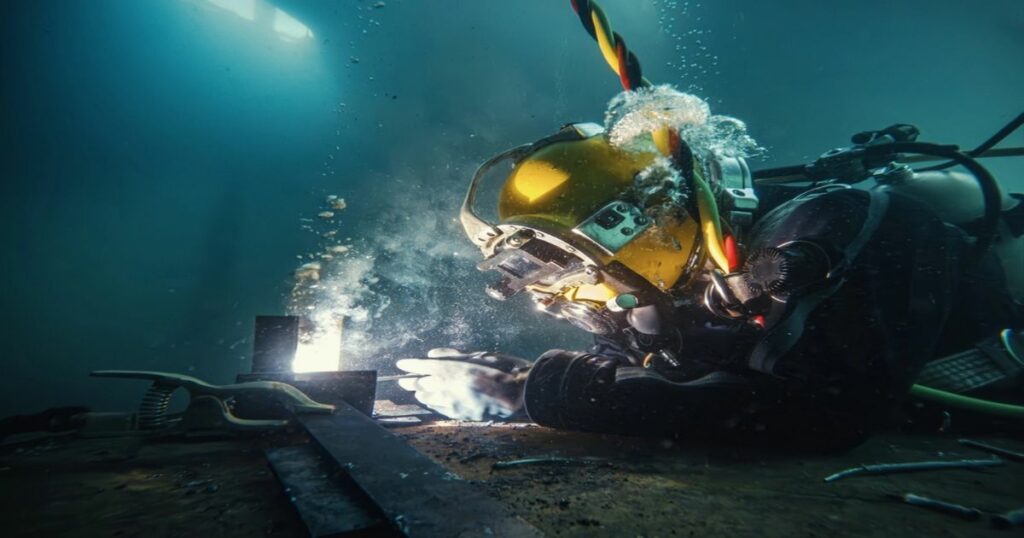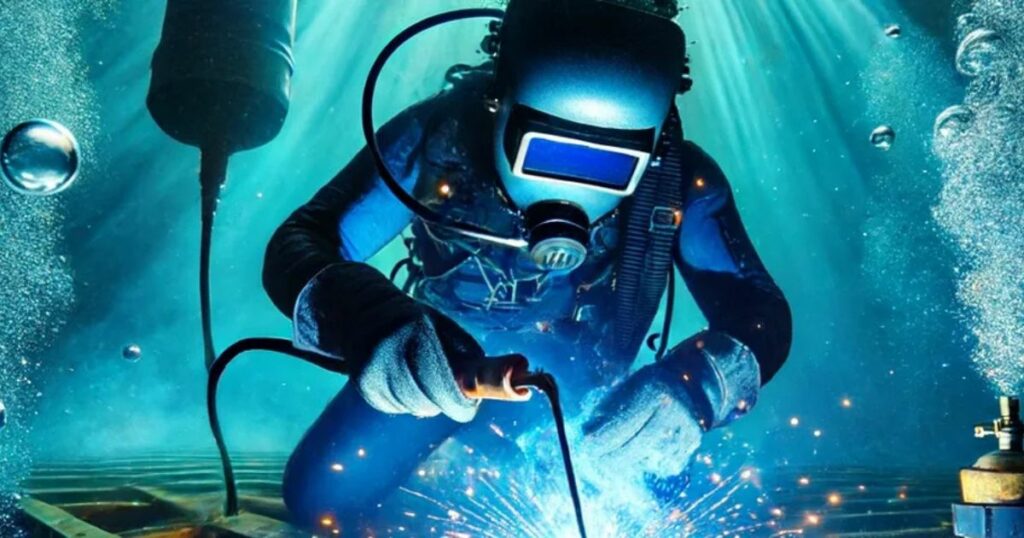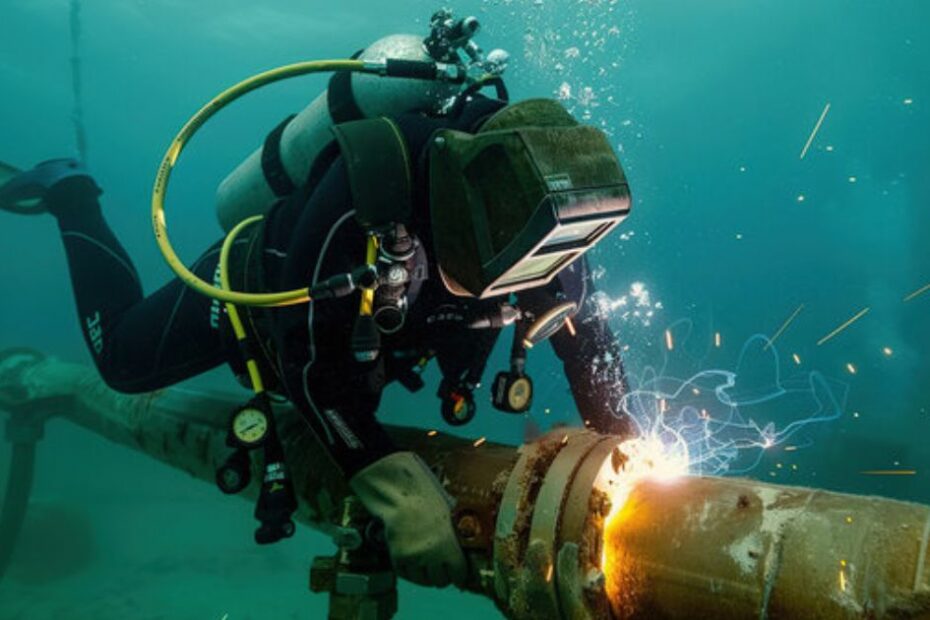Introduction
The role of an underwater welder is a challenging yet intriguing profession, involving welding structures both underwater and above the mark. This sector requires staff to provide not only technical but also physical input, and it is grounded on safety principles. By following these sections, you will learn about what underwater welding actually involves, how experts perform it, the dangers associated with it, and the prospects of being an underwater welder.
What is Underwater Welding?
Understanding Underwater Welding
Protection and Underwater welding also known as hyperbaric welding is a sub-set of welding that occurs underwater on water bodies such as oceans, lakes, and rivers. They are used in the repair of ships, offshore oil platforms, pipelines, and other structures that are installed underwater.
Types of Underwater Welding
There are two main types of underwater welding: There are two main types of underwater welding:
- Wet Welding: This technique involves the welding process being done in water and more specifically deep water. Special waterproof electrodes are employed, and the process takes place directly in the water in which the ships are built. The use of wet welding, however, is relatively easy compared to other forms of welding but it comes with some drawbacks like low-quality welds and there is always the danger of being electrocuted.
- Dry Welding (Habitat Welding): Dry welding on the other hand involves the use of a chamber that excludes the required environment to the area that requires welding. This technique gives a very good weld but it is a bit challenging and costly to arrange as compared to around welding.
The Science Behind Underwater Welding
Underwater welding is the use of the electric arc created between the electrode and the base material. The electric current in the arc makes the metal become hot and therefore fuse due to thermal fusion. The water surrounding is useful as it helps in cooling the body, which can be a plus or minus depending on the depth and condition of the water.
Skills and Qualifications Required
Essential Skills for Underwater Welders
Becoming an underwater welder requires a unique combination of skills, including Becoming an underwater welder requires a unique combination of skills, including:
Diving Certification: A commercial diving certification is nevertheless mandatory. This accreditation guarantees the welder’s capacity to work at the depth level that is necessary for underwater welding.
Welding Certification: Welding certification at an advanced level, and experience in underwater welding procedures.
Physical Fitness: It requires one to be in good health physically because the area of work as well as the operations involves the use of equipment that is rather demanding.
Problem-Solving Skills: Just like other welding professions, underwater welders must stay alert and analytical when they face problem-solving challenges during their jobs. Most often, they encounter problems while welding underwater, which can be stressful.
Training and Education
Commercial divers are the common entry point for most underwater welders, then they go for training in underwater welding. Technical schools, schools of scuba diving, and welding training centers offer a course.
Risks and Challenges

Understanding the Risks of Underwater Welding
Offshore welding and underwater welding are two of the most dangerous professions on the planet. The risks are numerous and include: The risks are numerous and include:
- Electric Shock: Water and electricity do not mix and are therefore electric shock hazards. The organizers take every care not to expose the participants to such situations, but occasionally, exposing them becomes unavoidable.
- Drowning: Like any other diving job, there is a dangerous probability of drowning especially when something goes off with the equipment of the diver.
- Decompression Sickness: This is commonly referred to as ‘the bends’ and is a result of the rapid ascent of a diver thus leading to the formation of nitrogen bubbles in the diver’s system.
- Explosions: Underwater welding can create the formation of gas bubbles and if not well handled the bubbles will explode.
Mitigating the Risks
To avoid such risks, underwater welders are trained and thereafter observe lots of precautions when proceeding to weld. This is because wearing PPE, simulations, and adherence to set safety measures help reduce cases of unfortunate happenings.
Tools and Equipment Used in Underwater Welding
Essential Equipment for Underwater Welding
Underwater welding requires specialized equipment, including Underwater welding requires specialized equipment, including:
- Waterproof Electrodes: These are made to be robust so as to accommodate underwater conditions and are essential in wet welding.
- Welding Helmets with Communication Systems: These helmets guard the welder’s face from extreme heat and radiation and permit the welder to talk to the surface group.
- Diving Suits: These suits intend to protect the welder from cold water and other environmental conditions.
- Underwater Welding Machines: Engineers build these machines specifically for submersion in water, ensuring their construction prevents any water from seeping into the innards. Additionally, designers create them to be safe.
Maintenance and Care of Equipment
It could be necessary to point out that maintenance of underwater welding equipment is critically important. These include timely inspection, repair, and storage so that the equipment is always in a proper condition to perform as expected and at the same time safely.
Career Opportunities and Salary Expectations

Job Prospects for Underwater Welders
This is especially so since underwater welding equipment requires proper maintenance for it to sustain the underwater task. Maintenance is important so as to check the equipment at the right time and repair or replace anything that may be wrong to avoid the equipment malfunctioning.
There is a great demand for underwater welders especially in the oil and gas sector as well as in the construction of ships and other marine structures. There are jobs available locally as well as globally, from simple annual maintenance renewal jobs to emergency repairs jobs.
Salary Expectations
Underwater welding is a highly-paid profession. Wages can vary from $50,000 to over $100,000 a year, the wages depending on experience, location, and the difficulty of the position. Still, it is important to note that some underwater welders might gain more money if they are willing to take extra hazards or if they work in some crucial areas.
Career Progression
Skilled underwater welders can receive promotions to supervisory or consulting positions. Others may decide to concentrate on the different categories of welding or venture into other related sub-disciplines like underwater inspection or engineering.
Frequently Asked Questions (FAQs)
Q1 How long does it take to become an underwater welder?
A: By the time one becomes an underwater welder, it usually takes 2-5 years in addition to the time used in acquiring diving and welding certifications.
Q2: What is the difference between wet and dry welding?
A: They perform wet welding in water, and they perform dry welding with the help of an enclosed chamber that removes moisture from the weld site.
Q3: Is underwater welding dangerous?
A: Indeed, experts confirm that underwater welding is one of the most deadly occupations, and some of the dangers associated with it include electrocution, drowning, and decompression sickness, among others.
Q4: What industries hire underwater welders?
A: Many companies like oil and gas, ships’ manufacturing, construction of marine-related structures, and infrastructure repair services require underwater welders’ services.
Q5: Can underwater welders work internationally?
A: Yes, but more experienced UW welders definitely do get chances of making it to international jobs which are majorly on the offshore oil and gas.
Conclusion
Welding underwater is not for the faint of heart but the job has its benefits and is all about challenges. If you find the prospect of attaching metals using a proclamation fascinating, or if the lure of diving excites you, this type of job allows you to work on essential projects in some of the hardest environments on our planet. However, to become an underwater welder requires adequate training, skills, and safety measures to perform the duty, but the pay is good.
